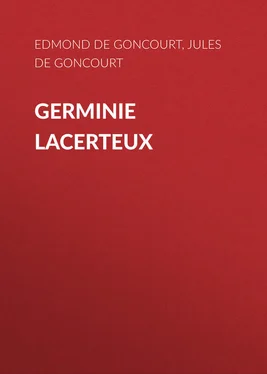Edmond de Goncourt - Germinie Lacerteux
Здесь есть возможность читать онлайн «Edmond de Goncourt - Germinie Lacerteux» — ознакомительный отрывок электронной книги совершенно бесплатно, а после прочтения отрывка купить полную версию. В некоторых случаях можно слушать аудио, скачать через торрент в формате fb2 и присутствует краткое содержание. Жанр: foreign_antique, foreign_prose, на английском языке. Описание произведения, (предисловие) а так же отзывы посетителей доступны на портале библиотеки ЛибКат.
- Название:Germinie Lacerteux
- Автор:
- Жанр:
- Год:неизвестен
- ISBN:нет данных
- Рейтинг книги:3 / 5. Голосов: 1
-
Избранное:Добавить в избранное
- Отзывы:
-
Ваша оценка:
- 60
- 1
- 2
- 3
- 4
- 5
Germinie Lacerteux: краткое содержание, описание и аннотация
Предлагаем к чтению аннотацию, описание, краткое содержание или предисловие (зависит от того, что написал сам автор книги «Germinie Lacerteux»). Если вы не нашли необходимую информацию о книге — напишите в комментариях, мы постараемся отыскать её.
Germinie Lacerteux — читать онлайн ознакомительный отрывок
Ниже представлен текст книги, разбитый по страницам. Система сохранения места последней прочитанной страницы, позволяет с удобством читать онлайн бесплатно книгу «Germinie Lacerteux», без необходимости каждый раз заново искать на чём Вы остановились. Поставьте закладку, и сможете в любой момент перейти на страницу, на которой закончили чтение.
Интервал:
Закладка:
Edmond de Goncourt
Germinie Lacerteux
PREFACE TO FIRST EDITION
We must ask pardon of the public for offering it this book, and give it due warning of what it will find therein.
The public loves fictitious novels! this is a true novel.
It loves books which make a pretence of introducing their readers to fashionable society: this book deals with the life of the street.
It loves little indecent books, memoirs of courtesans, alcove confessions, erotic obscenity, the scandal tucked away in pictures in a bookseller's shop window: that which is contained in the following pages is rigidly clean and pure. Do not expect the photograph of Pleasure décolletée : the following study is the clinic of Love.
Again, the public loves to read pleasant, soothing stories, adventures that end happily, imaginative works that disturb neither its digestion nor its peace of mind: this book furnishes entertainment of a melancholy, violent sort calculated to disarrange the habits and injure the health of the public.
Why then have we written it? For no other purpose than to annoy the public and offend its tastes?
By no means.
Living as we do in the nineteenth century, in an age of universal suffrage, of democracy, of liberalism, we asked ourselves the question whether what are called "the lower classes" had no rights in the novel; if that world beneath a world, the common people, must needs remain subject to the literary interdict, and helpless against the contempt of authors who have hitherto said no word to imply that the common people possess a heart and soul. We asked ourselves whether, in these days of equality in which we live, there are classes unworthy the notice of the author and the reader, misfortunes too lowly, dramas too foul-mouthed, catastrophes too commonplace in the terror they inspire. We were curious to know if that conventional symbol of a forgotten literature, of a vanished society, Tragedy, is definitely dead; if, in a country where castes no longer exist and aristocracy has no legal status, the miseries of the lowly and the poor would appeal to public interest, emotion, compassion, as forcibly as the miseries of the great and the rich; if, in a word, the tears that are shed in low life have the same power to cause tears to flow as the tears shed in high life.
These thoughts led us to venture upon the humble tale, Sœur Philomène , in 1861; they lead us to put forth Germinie Lacerteux to-day.
Now, let the book be spoken slightingly of; it matters little. At this day, when the sphere of the Novel is broadening and expanding, when it is beginning to be the serious, impassioned, living form of literary study and social investigation, when it is becoming, by virtue of analysis and psychological research, the true History of contemporary morals, when the novel has taken its place among the necessary elements of knowledge, it may properly demand its liberty and freedom of speech. And to encourage it in the search for Art and Truth, to authorize it to disclose misery and suffering which it is not well for the fortunate people of Paris to forget, and to show to people of fashion what the Sisters of Charity have the courage to see for themselves, what the queens of old compelled their children to touch with their eyes in the hospitals: the visible, palpitating human suffering that teaches charity; to confirm the novel in the practice of that religion which the last century called by the vast and far-reaching name, Humanity : – it needs no other warrant than the consciousness that that is its right.
Paris, October, 1864.
SECOND PREFACE
July 22, 1862. – The disease is gradually doing its work of destruction in our poor Rose. It is as if the immaterial manifestations of life that formerly emanated from her body were dying one by one. Her face is entirely changed. Her expression is not the same, her gestures are not the same; and she seems to me as if she were putting off every day more and more of that something, humanly speaking indefinable, which makes the personality of a living being. Disease, before making an end of its victim, introduces into his body something strange, unfamiliar, something that is not he , makes of him a new being, so to speak, in whom we must seek to find the former being – he, whose joyous, affectionate features have already ceased to exist.
July 31. – Doctor Simon is to tell me very soon whether our dear old Rose will live or die. I am waiting to hear his ring, which to me, is equivalent to that of a jury at the assizes, announcing their return to the court room with their verdict. "It is all over, there is no hope, it is simply a question of time. The disease has progressed very rapidly. One lung is entirely gone and the other substantially." And we must return to the invalid, restore her serenity with a smile, give her reason to hope for convalescence in every line of our faces. Then we feel an unconquerable longing to rush from the room and from the poor creature. We leave the house, we wander at random through the streets; at last, overdone with fatigue, we sit down at a table in a café. We mechanically take up a copy of L'Illustration and our eyes fall at once upon the solution of its last riddle: Against death, there is no appeal!
Monday, August 11. – The disease of the lungs is complicated with peritonitis. She has terrible pains in the bowels, she cannot move without assistance, she cannot lie on her back or her left side. In God's name, is not death enough? must she also endure suffering, aye, torture, as the final implacable breaking-up of the human organism? And she suffers thus, poor wretch! in one of the servant's rooms, where the sun, shining in through a window in the sloping roof, makes the air as stifling as in a hothouse, and where there is so little room that the doctor has to put his hat on the bed. We struggled to the last to keep her, but finally we had to make up our minds to let her go away. She was unwilling to go to Maison Dubois, where we proposed to take her; it seems that twenty-five years ago, when she first came to us, she went there to see the nurse in charge of Edmond, who died there, and so that particular hospital represents to her the place where people die. I am waiting for Simon who is to bring her a permit to go to Lariboisière. She passed almost a good night. She is all ready, in high spirits, in fact. We have covered everything up from her as well as we could. She longs to be gone. She is in a great hurry. She feels that she is going to get well there. At two o'clock Simon arrives: "Here it is, all right." She refuses to have a litter: "I should think I was dead!" she says. She is dressed. As soon as she leaves her bed, all the signs of life to be seen upon her face disappear. It is as if the earth had risen under her skin. She comes down into our apartments. Sitting in the dining-room, with a trembling hand, the knuckles of which knock against one another, she draws her stockings on over a pair of legs like broomsticks, consumptive legs. Then, for a long moment, she looks about at the familiar objects with dying eyes that seem desirous to take away with them the memory of the places they are leaving – and the door of the apartment closes upon her with a noise as of farewell. She reaches the foot of the stairs, where she rests for an instant on a chair. The concierge, in a bantering tone, assures her that she will be well in six weeks. She bows and says "yes," an inaudible "yes." The cab drives up to the door. She rests her hand on the concierge's wife. I hold her against the pillow she has behind her back. With wide open, vacant eyes she vaguely watches the houses pass, but she does not speak. At the door of the hospital she tries to alight without assistance. "Can you walk so far?" the concierge asks. She makes an affirmative gesture and walks on. Really I cannot imagine where she procured the strength to walk as she does. Here we are at last in the great hall, a high, cold, bare, clean place with a litter standing, all ready for use, in the centre. I seat her in a straw armchair by a door with a glazed wicket. A young man opens the wicket, asks my name and age and writes busily for quarter of an hour, covering ten or more sheets of paper with a religious figure at the head. At last, everything is ready, and I embrace her. A boy takes one arm, the housekeeper the other. – After that, I saw nothing more.
Читать дальшеИнтервал:
Закладка:
Похожие книги на «Germinie Lacerteux»
Представляем Вашему вниманию похожие книги на «Germinie Lacerteux» списком для выбора. Мы отобрали схожую по названию и смыслу литературу в надежде предоставить читателям больше вариантов отыскать новые, интересные, ещё непрочитанные произведения.
Обсуждение, отзывы о книге «Germinie Lacerteux» и просто собственные мнения читателей. Оставьте ваши комментарии, напишите, что Вы думаете о произведении, его смысле или главных героях. Укажите что конкретно понравилось, а что нет, и почему Вы так считаете.











